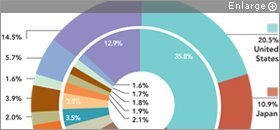The United States still leads the world in having a college-educated workforce, but it is the only country among the world’s leading economies whose incoming workers are less educated than those retiring, according to a new study by the Organization for Economic Cooperation and Development.
Released last week, the OECD’s “Education at a Glance 2011” report compares education systems in the Group of Twenty, or G-20, economies, which include 19 countries and the European Union.
It finds that in 2009, Americans accounted for more than one in every four of the 225 million people with postsecondary degrees in the G-20 countries. But a closer look at the statistics reveals a deep generational divide among degree-holders: Americans make up more than a third of all postsecondary degree holders, ages 55 to 64, but only one-fifth of those ages 25 to 34.
“It’s not that the United States is doing worse; it’s that other countries are starting to do what the United States has been doing for a very long time,” said Andreas Schleicher, who heads the indicators and analysis division at the OECD’s Directorate for Education, in a briefing on the report. “There’s been a quite dramatic expansion of the pool of qualified people.”
Among the world’s leading economies, the United States accounts for 35.8 percent of all postsecondary degreeholders between the ages of 55 and 64 (inner ring). Among 25-to-34-year-old postsecondary degree-holders, the U.S. share accounts for 20.5% (outer ring).

SOURCE: Organization for Economic Cooperation and Development
China, in particular, has been gaining ground in education. Chinese between 25 and 34 held nearly triple the global share of postsecondary degrees, 18.3 percent, compared to its older workers, who represent only 6.9 percent of postsecondary degrees in their age group.
China on the Rise
Moreover, China’s educational edge is likely to grow. In 2009 China had 36.6 percent of the world’s students entering college, compared with the United States’ 12.9 percent share, and China accounted for 42.6 percent of the world’s students graduating high school, compared with 9.9 percent for American students.
Because of its well-educated older workers, the United States still ranks in the top five most-educated countries among the G-20, but it drops to 15th among those ages 25 to 34—a decline that could deeply affect the nation’s economic well-being, as prior research shows education has a greater effect on a person’s earnings than factors such as race or gender.
Educational attainment can play a role in a country’s politics and social fabric, too. The OECD study also found that 14-year-olds who scored higher on the International Civic and Citizenship Education Study were more likely to vote and to favor gender equality than those with lower civics education.
Mr. Schleicher said higher education in the United States is more expensive than that in other countries, and U.S. students feel a greater sense of risk in taking on student loans.
He added, however: “Tuition that U.S. students pay is still low in comparison to the benefits that you get.” After accounting for gender, age and income, adults with higher education reported they were “more satisfied with life, engaged in society and likely to report that they are in good health.”





